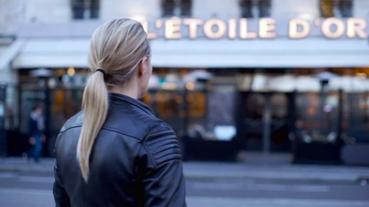 A Parisian woman who has survived a mass shooting feels compelled to remember the traumatic event that she has blocked out.
A Parisian woman who has survived a mass shooting feels compelled to remember the traumatic event that she has blocked out.
Revoir Paris is the latest film from French director Alice Winocour. I’ve seen the title translated as Paris Memories, which, for many, might sound like a romance, but it’s far from that. The subject is trauma, or more precisely, the experience of having suffered severe trauma.
Mia, played by Virginie Efira, is a young Parisian who lives with Vincent, a doctor, played by Grégoire Colin. One night, she ducks into a bistro to get out of a rainstorm. Near her is a table with a group of people celebrating a man’s birthday. She briefly exchanges glances with the man. Later, while going back to her table from the restroom, two people in front of her are shot down, the place erupts with screams, and she’s on the floor. A gunman is walking through the bistro shooting everyone in sight. Winocour does not make this scene too graphic—the shock inherent in the situation is unnerving enough.
Cut to: Mia being prepared for release from the hospital. She has a big scar on her side. Then we cut to three months later. We discover that she has gone to live with her mother in the country for that time, and now she’s back in Paris, but feeling lost emotionally. She can’t remember the shooting, and this loss of memory is accompanied by a sense of grief so acute that she can’t let go of it. We hear a brief voice-over from Vincent describing how he learned of the attack and searched frantically for Mia. He shares in the trauma experienced by others who weren’t there—the film doesn’t want to minimize that—but we soon see that this is qualitatively different than the trauma of those who were.
One day, Mia finds herself drawn irresistibly back to the bistro. She learns that a certain weekday is reserved for survivors to gather there. When she goes to this event later, she meets a young woman whose parents had been killed: they texted her a photo right before their death which just happened to show Mia in the background. But she still can’t remember anything. Then she encounters the man who had been celebrating his birthday at the next table—Thomas, played by Benoît Magimel. One of his legs has been surgically reconstructed, and he uses a crutch. He remembers everything, and his memories help Mia to begin the long process of recalling what happened to her.
The shooting is loosely based on the November 2015 terrorist attacks in Paris, but Winocour and her co-screenwriters are not concerned with any political implications. The fact of it being a mass shooting, a very public tragedy, feeds into the film’s vivid sense of loss. There is, for instance, a large display of memorial tributes outside of the bistro.
The search for true memory seems tentative at first, but then Mia recalls the hidden meaning of her quest. Here the film ingeniously ties in the fact that many of the kitchen staff in Paris restaurants are undocumented immigrants. Those who survived the shooting fled the bistro to avoid being caught. Mia remembers one of them who helped her survive. She feels an urgent need to find him.
This is a story with characters and a plot, but the brilliant thing about it is how the director manages to make all that seem strange and ephemeral. Revoir Paris maintains, with its honesty and compassion, a persistent sense of overwhelming shock and trauma front and center throughout.

The endlessly cyclical nature of life is depicted as four different stories in a sleepy Italian village. Le Quattro Volte, a film from 2010...

Selecting a new Pope seems a ripe subject for drama because of the air of secrecy surrounding it. It’s not that the mechanics of...

Gloria, a new film from Chile, seemed top be such a simple story that I thought “Why should I see this?” until I finally...